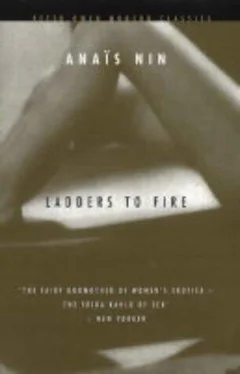Anaïs Nin - Ladders to Fire
Здесь есть возможность читать онлайн «Anaïs Nin - Ladders to Fire» весь текст электронной книги совершенно бесплатно (целиком полную версию без сокращений). В некоторых случаях можно слушать аудио, скачать через торрент в формате fb2 и присутствует краткое содержание. Год выпуска: 2004, ISBN: 2004, Издательство: Peter Owen Limited, Жанр: Классическая проза, Эротические любовные романы, на английском языке. Описание произведения, (предисловие) а так же отзывы посетителей доступны на портале библиотеки ЛибКат.
- Название:Ladders to Fire
- Автор:
- Издательство:Peter Owen Limited
- Жанр:
- Год:2004
- ISBN:9780720611625
- Рейтинг книги:5 / 5. Голосов: 1
-
Избранное:Добавить в избранное
- Отзывы:
-
Ваша оценка:
- 100
- 1
- 2
- 3
- 4
- 5
Ladders to Fire: краткое содержание, описание и аннотация
Предлагаем к чтению аннотацию, описание, краткое содержание или предисловие (зависит от того, что написал сам автор книги «Ladders to Fire»). Если вы не нашли необходимую информацию о книге — напишите в комментариях, мы постараемся отыскать её.
Cities of the Interior
Children of the Albatross
The Four-Chambered Heart
A Spy in the House of Love
Solar Barque
Ladders to Fire — читать онлайн бесплатно полную книгу (весь текст) целиком
Ниже представлен текст книги, разбитый по страницам. Система сохранения места последней прочитанной страницы, позволяет с удобством читать онлайн бесплатно книгу «Ladders to Fire», без необходимости каждый раз заново искать на чём Вы остановились. Поставьте закладку, и сможете в любой момент перейти на страницу, на которой закончили чтение.
Интервал:
Закладка:
“Oh, Lillian, it’s such a struggle to emerge from the past clean of regrets and memories and of the desire to regress. No one can accept failure.”
She wanted to take Lillian’s hand and make her raise her head and lead her into a new circle, raise her above the pain and confusion, above the darkness of the present.
These sudden shafts of light upon them could not illumine where the circle of pain closed and ended and woman was raised into another circle. She could not help Lillian emerge out of the immediacy of her pain, leap beyond the stranglehold of the present.
And so they continued to walk unsteadily over what Lillian saw merely as the dead leaves of his indifference.
Jay and Lillian lived in the top floor studio of a house on the Rue Montsouris, on the edge of Montparnasse—a small street without issue lined with white cubistic villas.
When they gave a party the entire house opened its doors from the ground floor to the roof, since all the artists knew each other. The party would branch off into all the little street with its quiet gardens watched by flowered balconies.
The guests could also walk down the street to the Park Montsouris lake, climb on a boat and fancy themselves attending a Venetian feast.
First came the Chess Player, as lean, brown, polished, and wooden in his gestures as a chess piece; his features sharply carved and his mind set upon a perpetual game.
For him the floors of the rooms were large squares in which the problem was to move the people about by the right word. To control the temptation to point such a person to another he kept his hands in his pockets and used merely his eyes. If he were talking to someone his eyes would design a path in the air which his listener could not help but follow. His glance having caught the person he had selected made the invisible alliance in space and soon the three would find themselves on the one square until he chose to move away and leave them together.
What his game was no one knew, for he was content with the displacements and did not share in the developments. He would then stand in the corner of the room again and survey the movements with a semitone smile.
No one ever thought of displacing him, of introducing him to strangersight w
But he thought it imperative to bring about an encounter between the bearded Irish architect and Djuna, because he had conceived a house for many moods, a house whose sliding panels made it one day very large for grandiose states of being, one day very small for intimate relationships. He had topped it with a removable ceiling which allowed the sky to play roof, and designed both a small spiral staircase for secret escapades and a vast one for exhibitionism. Besides, it turned on a pivot to follow the changing whims of the sun, and who but Djuna should know this house which corresponded to her many moods, to her smiling masks and refusal to show her night face, her shadows and her darkness, she who turned on artificial pivots always towards the light, who was adept at sliding panels to make womb enclosures suitable to intimate confessions, and equally capable ofopening them all at once to admit the entire world.
Djuna smiled at the Chess Player’s accuracy, and he left them standing on the square while the Irish architect began with silken mouthfuls of words to design this house around Djuna as if he were spewing a cocoon and she would leave the party like a snail with a house built around her to the image ofher needs. On her black dress he was drawing a blue print.
On this square something was being constructed and so the Chess Player moved on, his eyes made of the glass one could look through without being seen and now he seized upon Faustin, the Zombie, the one who had died under the first blow struck at him byexperience. Most ofthose who die like this in the middle of their life await a resuscitation, but Faustin awaited nothing: every line of his body sagged with acceptance, the growing weight of his flesh cushioned inertia, submission. The blood no longer circulated and one could see the crystal formations of fear and stagnation as in those species of fish living in the deepest waters without eyes, ears, fins, motion, shaped like loaves of bread, nourishing themselves through static cells of the skin. His one obsession was not to free himself of his death but to stand like a black sentinel at the gate and prevent others escaping from their traps. He lived among the artists, the rebels, never acquiescing in their rebellions, but waiting for the moment of Jay’s fullest sunburst of enthusiasm to puncture it with irony, waiting for Lillian’s wildest explosions to shame her as an exhibitionist, watching for Djuna’s blurred absences from reality to point out her delinquencies from the present. His very expression set the stage for the murder; he had a way of bearing himself which was like the summation of all the prohibitions: do not trespass, do not smoke, do not spit, do not lean out of the window, no thoroughfare, do not speed.
With his black eyes and pale face set for homicide he waited in a corner. Wherever he was, a black moth would enter the room and begin its flights of mourning, black-gloved, black-creped, black-soled, inseminating the white walls with future sadnesses. The silence which followed his words clearly marked the withering effect of them and the time it took for the soil to bloom again. Always at midnight he left, following a rigid compulsion, and the Chess Player knew he must act hastily if he were going to exploit the Zombie’s death rays and test their effect upon the living.
He walked the Zombie towards the fullest bloom of all, towards the camellia face of Sabina which opened at a party like the crowned prize-winner of the flower shows and gave every man the sensation he held the tip of a breast in his teeth. Would Sabina’s face close when the shadow of Faustin fell across it, when the black moth words and the monotonous voice fell upon her ears curtained intricately by her anarchic hair?
She merely turned her face away: she was too richly nourished with pollen, seeds and sap to wither before any man, even a dead one. Too much love and desire had flown through the curves of her body, too many sighs, whispers, lay folded in the cells of her skin. Through the many rivers of her veins too much pleasure had coursed; she was immune.
Faustin the Zombie felt bitterly defeated, for he loved to walk in the traces of Jay’s large patterns and collect his discarded mistresses. He loved to live Jay’s discarded lives, like a man accepting a second-hand coat. There was always a little warmth left in them.
From the moment of his defeat, he ceased to attend the Party, even in his role of zombie, and the Chess Player whose role it was to see that the Party was attended at all cost, even at the cost of pretending, was disturbed to see this shadowy figure walking now always between the squares, carefully setting his foot on that rim of Saturn, the rim of nowhere which surrounds all definite places. One fallen piece.
The Chess Player’s eyes fell on Djuna but she had escaped all seizure by dissolving into the music. This was a game he could not play: giving yourself. Djuna gave herself in the most unexpected ways. She lived in the cities of the interior, she had no permanent abode. She was always arriving and leaving undetected, as through a series of trap doors. The life she led there no one knew anything about. It never reached the ears of reporters. The statisticians of facts could never interview her. Then unexpectedly, in a public place, in a concert hall, a dance hall, at a lecture, at a party, she gave the immodest spectacle of her abandon to Stravinsky, her body’s tense identification with the dancer, or revealed a passionate interest in the study of phosphenes.
And now she sat very neatly shaped in the very outline of the guitar played by Rango, her body tuned by the keys of her fingers as if Rango were playing on the strands of her hair, of her nerves, and the black notes were issuing from the black pupils of her eyes.
Читать дальшеИнтервал:
Закладка:
Похожие книги на «Ladders to Fire»
Представляем Вашему вниманию похожие книги на «Ladders to Fire» списком для выбора. Мы отобрали схожую по названию и смыслу литературу в надежде предоставить читателям больше вариантов отыскать новые, интересные, ещё непрочитанные произведения.
Обсуждение, отзывы о книге «Ladders to Fire» и просто собственные мнения читателей. Оставьте ваши комментарии, напишите, что Вы думаете о произведении, его смысле или главных героях. Укажите что конкретно понравилось, а что нет, и почему Вы так считаете.












